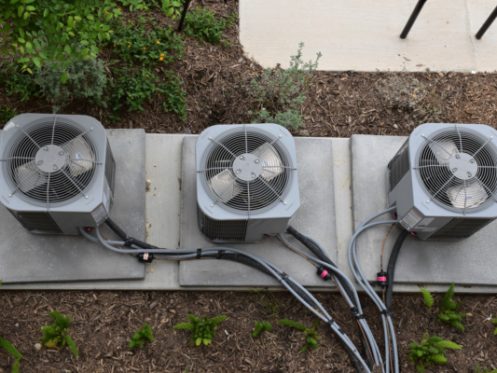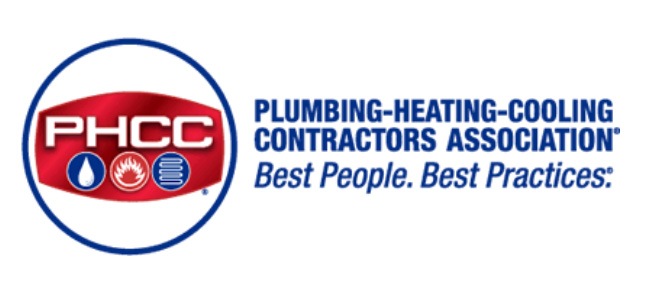HVAC units like air conditioners and heat pumps that sit outside a home are designed to be extremely weather resistant and capable of withstanding rain, wind, and the elements without much of an issue. Nonetheless, we frequently have customers asking whether they need to cover their outdoor HVAC unit during the winter to protect it from snow and ice. Covering your AC unit over the winter isn’t strictly necessary, but it also isn’t a bad idea. On the other hand, a heat pump should never be covered since it will continue to run throughout the winter to provide heating. Here is a full overview of the reasons why covering an outdoor AC unit can be a good idea and also how to cover your unit properly to prevent possible damage.
Reasons to Cover Your AC Unit
Snow and ice generally aren’t a major issue for AC units as, again, they are designed to stand up to the elements. That being said, you still don’t really want a huge amount of snow covering and filling up the inside of the unit as all of the moisture can eventually lead to issues with rust and corrosion. While this generally isn’t a problem in places like Northern Virginia where it rarely ever snows more than a few inches at a time, covering your AC unit is still not a bad idea. In fact, snow and ice aren’t the main reason why many experts recommend covering outdoor HVAC units when they’re not in use.
The primary reason that covering an AC unit is a good idea is to keep leaves, pine needles, seeds, and other debris from collecting inside the unit. If the unit becomes filled with leaves and debris, it will prevent it from working properly when you turn it on again next year. Most commonly, it will lead to the unit overheating as the debris can block the airflow and prevent it from properly dispersing the heat it removed from inside your home.
Having your air conditioning system maintained every spring will obviously eliminate this issue since the technician will fully clean and inspect the unit. Nonetheless, covering your AC will help to prevent debris from causing any issues in case you suddenly need to run the unit before you have time to get it cleaned and maintained.
Still, the biggest reason that covering the unit to keep out debris is a good idea has to do with moisture buildup. Leaves and other organic matter will soak up and hold onto a lot of water every time it rains or snows. If there is lots of moist debris inside the AC unit, it can lead to wet spots and moisture building up inside it, and this greatly increases the potential for rust and corrosion.
Another reason to consider covering your AC unit is to prevent any potential damage from falling icicles. If a large icicle comes crashing down on the unit, it could easily damage the fan blades and motor near the top of the AC. There is also a small chance that icicles could fall inside the unit and possibly damage the condenser coil or refrigerant lines, and keeping the unit covered during the winter should obviously reduce the chances of any of this happening.
How to and How Not to Cover an AC Unit
You generally have two options for covering an AC unit. You can either place a piece of plastic or a tarp over the top of it or else cover it with a sheet of plywood. What you should never do is wrap the entire unit in plastic or a tarp as this will cause far worse issues than if you left it uncovered all winter.
If the sides of the AC are completely covered, it prevents air from flowing through the unit and drying it out. This will cause moisture to get trapped inside and quickly lead to rust and corrosion. The only exception to this rule is if you use an AC cover that was specially designed for your unit as these are made to be breathable to prevent moisture from accumulating inside the unit.
Using a tarp or piece of plastic is still perfectly fine as long as you make sure that it doesn’t extend down the sides of the unit by more than 6 inches or so. Any further and you run the risk of moisture accumulating on the fan motor and causing damage due to rust.
If you choose to use a piece of plywood to cover your AC, you need to make sure that you weigh it down well enough that it can’t blow off. If the plywood does get blown off, it could come crashing down on the refrigerant lines and cause them to leak, and this can be quite expensive to repair.
However you decide to cover the unit, you should first make sure to clean any debris out of it to prevent it from holding on to moisture. This can be done by removing the fan assembly and cover, or you can have an HVAC technician do this for you if you’re not comfortable or sure what you’re doing.
Other Tips for Winterizing Your AC
There are also a few other steps you can take to help prevent possible damage to your AC unit over the winter. One thing that we always recommend is to turn the power off to the unit once you’ve shut it off for the year. Most AC systems are set up so that there is a power switch located somewhere outside near the unit. In this case, simply turn the switch to the “OFF” position to shut off the power. If you don’t have an outdoor switch, you will need to switch off the circuit breaker that controls the unit in your main electrical panel.
Shutting off the power to the unit ensures that it won’t run in case you accidentally switch your thermostat to cool. Running an air conditioner in cold weather can cause numerous, potentially serious issues. The unit will often freeze up in a matter of minutes, which can lead to the compressor motor overheating and possibly burning out. The weather doesn’t even have to be freezing for this to occur as ACs will often freeze up if the temperature is under 50 degrees. The easiest way to prevent anything from happening is to switch off the power so the unit can’t ever run.
The other thing that you’ll want to do is make sure that the insulation covering the refrigerant lines is in good shape and fully covers the entire length of the lines leading out from the AC unit to where they enter your home. If the lines aren’t fully wrapped with insulation, the cold air could cause the refrigerant to freeze and the copper lines to rupture.
If you have any questions or need any help preparing your AC for winter, Meade’s Heating and Air is here for you. We can also help with any of your cooling or heating maintenance or repair needs, and we also specialize in installing furnaces, air conditioners, and ductless HVAC units. In addition, we offer a range of indoor air quality services and equipment, including air quality testing, humidifiers, dehumidifiers, UV sanitizers, and air purification systems, and our team installs, repairs, and maintains water heaters and gas lines as well. For more information or to schedule any service, contact us today.




